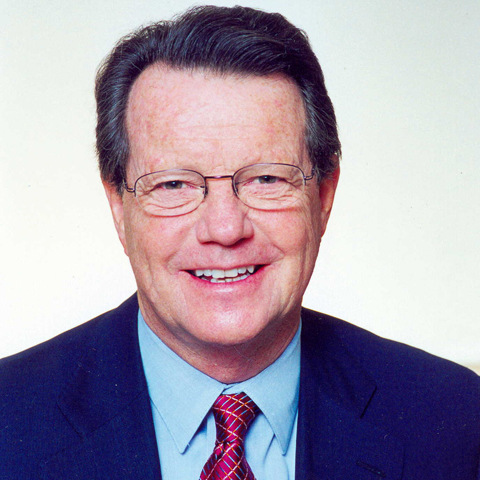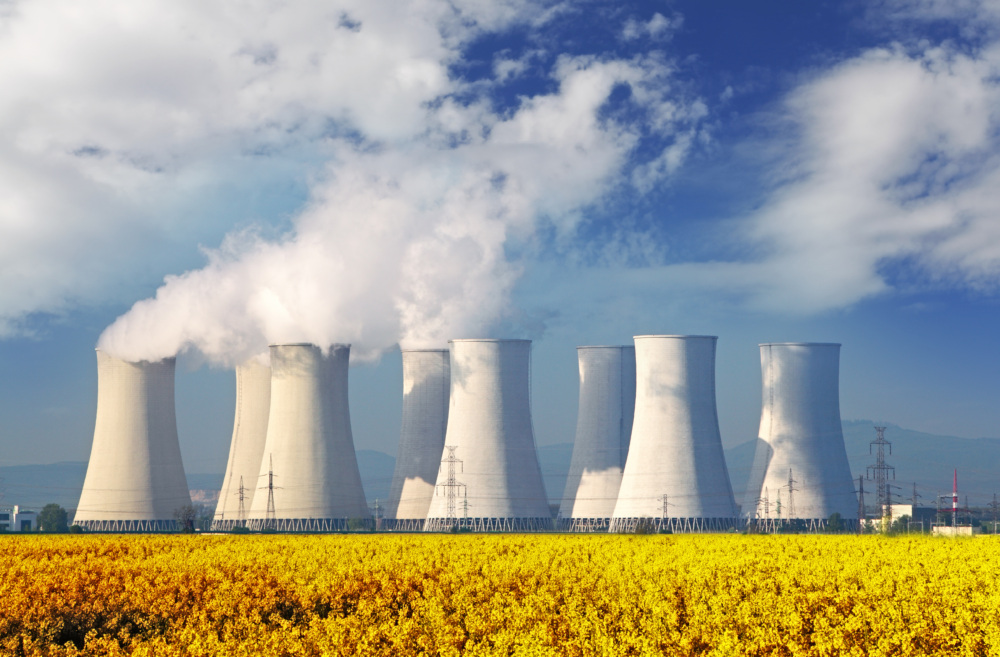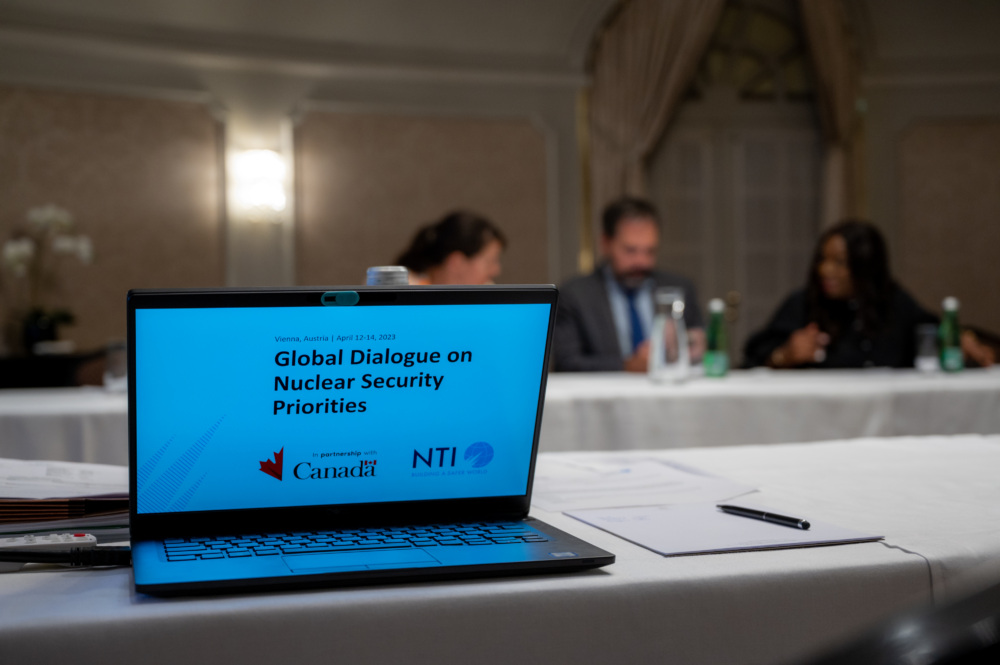
Charles B. Curtis
NTI President Emeritus and Emeritus Board Member
Thank you. It is a special honor to have a place at the podium at the 50th Annual meeting of the Institute of Nuclear Materials Management.
Completing the celebrations of your 50th year is a happy occasion. Of course, the real celebration is not that you’ve survived 50 years – but what you’ve accomplished in that time.
In the late 1950s, when a group of professionals came together to discuss the establishment of a new Institute – the primary concern was preventing loss of material that was expensive to make and essential to the military policies of the United States.
The rise of terrorist groups with global reach was not on the minds of the people present. Nor was the prospect that such a terrorist group might one day acquire nuclear weapons or the means to make them.
But the measure of any great organization is whether it can apply its principles and its growing expertise to meet the evolving needs of the people it serves. You have met that test.
Four years ago, I came to this meeting to invoke your past to make an appeal for the future. I cited a 1970 INMM report which bluntly criticized Atomic Energy Commission safeguards in transporting nuclear materials. That kind of candor in 1970 was startling – and the report included this explanation: “As a professional society, the Institute of Nuclear Materials Management can do no less than follow objectively where professional responsibility and logic lead.”
I then suggested to the professionals gathered in 2005 that the current nuclear material security situation required a comparable act of leadership – one in keeping with the heritage of the INMM.
The Chair and the Vice Chair of the 9/11 Commission had both recently stated that the terrorist nuclear threat was the greatest threat facing the country.
Al Qaeda was reported to be seeking a nuclear weapon since the early 1990s. The nuclear materials they need is housed in hundred of sites around the globe. We all know our best defense against nuclear terrorism was to make the nuclear materials at these sites as secure as possible. And we all knew these materials were not “as secure as we could make them.”
I was not telling you this story to inform you of these facts; you already knew them.
I told this story because I had an agenda.
The Government of the United States and governments around the world had launched a number of important initiatives to keep nuclear materials out of terrorist hands. But two pieces were missing: We had no formal plan to identify the world’s best practices in nuclear materials security; and we had no plan to put these best practices in place in every facility with nuclear or radiological materials where ever located in the world.
These were not steps that regulatory bodies could accomplish with the efficiency the task required. But they were steps that the nuclear community could take – voluntarily – with the right leadership.
So I came to your annual conference to appeal to you to use your expertise and your leadership to help build a new international organization – with the goal of spreading best practices in materials security to every nuclear facility in the world.
You immediately formed a committee of INMM Fellows to think about how INMM should engage this issue. A Coordinating Committee was formed that included representatives from INMM, DOE and NTI. A series of workshops led to a business plan in line with the 2005 recommendations of the INMM fellows.
The final plan was supported by the US Department of Energy, by the Governments of Norway and Canada, by an NTI grant, and also by the International Atomic Energy Agency (IAEA) whose own leadership saw very early that WINS could play a vital role in complementing the work of the IAEA.
So in Vienna this past September, with your immediate Past President Nancy Jo Nicholas representing all of you, the World Institute for Nuclear Security, or WINS, was established – designed to share best practices on physical protection of nuclear and radiological materials, with a focus on keeping nuclear weapons out of terrorist hands. It has been headquartered in Vienna to ensure close cooperation with the vital work of the IAEA.
As an article in the Economist described it: “WINS is a place where for the first time those with the practical responsibility for looking after nuclear materials – governments, power plant operators, laboratories, universities – can meet to swap ideas and develop best practices.”
Dr. Roger Howsley has been appointed as the organization’s first Executive Director. Dr. Howsley previously served as Director for Security, Safeguards, and International Affairs at British Nuclear Fuels, where he was responsible for security and safeguards covering 17,000 employees in 16 countries. He also co-chaired the police force responsible for armed defense of civil nuclear sites in the UK. He is a consummate professional drawn from your ranks and is a great leader for this new organization.
WINS held its inaugural workshop this past May in the UK – in collaboration with the UK’s Nuclear Decommissioning Authority and the US National Nuclear Security Administration. Dr. Howsley noted that the workshop showed again what was proved out in a pilot program in Norway and at workshops in Baden and Prague – that you can share best practices without divulging sensitive nuclear information.
In addition, WINS was invited to last month’s meeting of the 75 nation Global Initiative to Combat Nuclear Terrorism, held in The Hague. The head of the US delegation and co-chair of the meeting said this in his plenary remarks:
“My government strongly supports WINS as a complementary component of the Global Initiative to Combat Nuclear Terrorism and I encourage each of your delegations to carry back to your capitals the need to support and participate in WINS.”
Clearly, our new organization is being welcomed by major governments and international organizations – they see WINS as a helpful and necessary part of the international architecture for bolstering nuclear security.
This is a terrific accomplishment in very short time. I want to pause just a moment and recognize some of the people who – out of a sense of professional responsibility and public duty – helped build the World Institute for Nuclear Security:
INMM past presidents Cathy Key and my fellow WINS Board member Nancy Jo Nicholas played material roles. Both encouraged the active participation of the INMM membership, Executive Committee, and Fellows to help develop the WINS concept from the beginning.
The INMM Fellows’ Committee and the WINS Steering Committee: including, in particular John Matter, Paul Ebel, Dennis Mangan and Ed Johnson provided invaluable guidance from day-one.
WINS Coordinating Committee participants: helped make it all happen. We should all thank Jim Tape – who worked tirelessly on a volunteer basis, and Joyce Connery – who worked within the Department of Energy, the National Security Council and across the US government.
I want also to acknowledge the contribution my NTI colleagues Joan Rohlfing and Laura Holgate, and especially our Director of International Programs Corey Hinderstein, without whose efforts we would not have gotten WINS off the ground. Many others here – and some who couldn’t be here – played vital roles. We could not have established WINS without the collective expertise, guidance, and commitment of the INMM membership and the nuclear materials management community as a whole. I thank you all.
I’m now going to break an honored rule of courtesy, tactics and politics – namely, the rule that says: “Never say thank you and make a new request in the same message. It’s bad form.”
I try to observe this rule in most circumstances. But I do believe there is a national security exception to this rule – which I would like to invoke here.
In Prague this past spring, President Obama announced an international effort to secure all vulnerable nuclear material around the world in four years. Nothing can speed improvement of security faster than having the experts become the teachers – and spread best practices. That is the founding purpose of WINS. It will be crucial to the global effort to secure nuclear materials to the highest standards. That is why we have to move now to build WINS up quickly so its membership includes those who have the most to learn, and those who have the most to teach.
To bolster my point, I would like to draw on the words of our departed firend Vince DeVito. His wisdom will keep guiding this organization for a long time to come. A while back, Vince was asked to write some reflections on INMM for the 50th anniversary year – he was the unofficial historian after all. In his account, he described the formation meeting fifty years ago when the first officers were named. And then he wrote: “It was recognized that to start achieving the objectives they set for INMM, the most urgent concern was increasing membership.”
In short, to make an initiative work, you’ve got to get everyone involved. That was true for the INMM 50 years ago. It is true today for WINS.
WINS now has applications from more than 30 countries. The new members are being surveyed about their concerns – and they are now shaping the WINS agenda. The INMM is an ex officio member of the advisory council – as is the IAEA – but to make this organization effective and vital we are seeking the membership of your companies, your agencies and organizations.
Membership can help you shape this new organization, improve your own practices, and give you the chance to dedicate your talents to the cause of global security. If you need a greater incentive than that, here’s another one: it won’t cost you anything for the next year and a half. But we need more than just your membership. We need your home organizations to send experts to WINS events, host events, and provide material support.
In plain words, I am asking you to dedicate your talent and expertise to making WINS a success. I hope you conclude that this commitment is – in the words of that 1970 report – “where professional responsibility and logic lead.”
The clock is ticking. As my leader, former Senator Sam Nunn, points out, “we are in a race between cooperation and catastrophe.”
Conclusion:
At the start of my remarks, I noted that one test of a great organization is whether it can change with the times. As you conclude the 50th year celebrations, you can confidently say that you have met that test.
But there is a higher test of greatness – not just whether you can change with the times – but whether you yourself can change the times.
By playing an indispensable and expanding role in the global security of nuclear materials, you will be answering an urgent need to apply your expertise to the greatest cause you can – ensuring a safer future for the human family. I thank you for what you’ve done in the past – and I look forward to what we can do together in the future.
###
Sign up for our newsletter to get the latest on nuclear and biological threats.
To make good on their COP28 pledge, countries need a new approach to building, regulating, and financing nuclear technology.
Lessons Learned from 10 Years of the Global Dialogue on Nuclear Security Priorities
The NTI Index is recognized as the premier resource and tool for evaluating global nuclear and radiological security.


